(Photo via.)
I'm very sad to hear that the poet Ai died last weekend of breast cancer. She was 62.
She was one of my favorite poets when I was in college, introduced to me by my poetry prof, Jane Miller, and taken up by me as a seamless modern replacement for my high-school beloved, Browning. I love dramatic monologue, you see, love the narrators, reliable, unreliable, fucked up, and all; love discovering the back story, bit by bit, through their seemingly careless or intrepid revelations. Ai got to me right away.
And then I found out she was hapa and that just did me in. I got to see her read once at a community center in Tucson. She wasn't living there at the time and she refused to fly, so she came in on a bus, and somehow the unfortunate detailed to pick her up had missed her. Ai stomped into the community center, late and fuming, and interrupting the poet who was already reading. (Kimiko Hahn, as it happens, in support of her first book, and very much the opening act.)
"Who is the fucking idiot who was supposed to pick me up?" was the first thing she said (or something very near to what she said anyway,) thus insuring that no one was going to step forward. She very quickly calmed down and explained to the audience that she hated traveling and was terribly rattled by the whole incident. She was vivid and charming, and wore bright red socks, and read her demotic poetry in a rhythmic croon that was the godparent of spoken word.
She was born Florence Anthony in Texas and raised (mostly in Tucson) not knowing that she was the product of “scandalous affair my mother had with a Japanese man she met at a streetcar stop." She later studied Japanese in college and had her name legally changed to "Ai," which means "love" in Japanese. She identified as Japanese, Choctaw-Chickasaw, Black, Irish, Southern Cheyenne, and Comanche.
About race Ai famously said:
People whose concept of themselves is largely dependent on their racial identity and superiority feel threatened by a multiracial person. The insistence that one must align oneself with this or that race is basically racist. And the notion that without a racial identity a person can’t have any identity perpetuates racism…I wish I could say that race isn’t important. But it is. More than ever, it is a medium of exchange, the coin of the realm with which one buys one’s share of jobs and social position. This is a fact which I have faced and must ultimately transcend. If this transcendence were less complex, less individual, it would lose its holiness.
She published eight books of poetry (a ninth is forthcoming this year) and won a number of awards, including the National Book Award for the book Vice. You can read more about her largely academic career here. You can read a detailed analysis of her poetry, and some samples, here. Here is an obituary. And here is a personal remembrance from a friend.









Comments